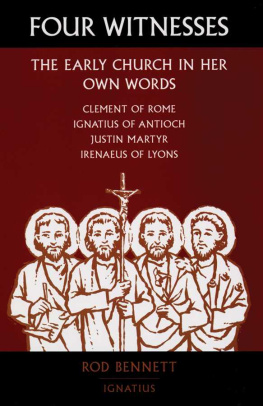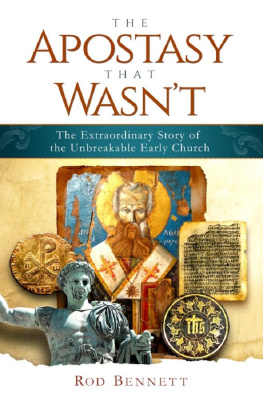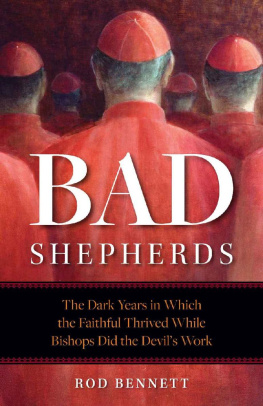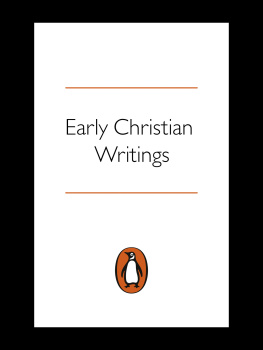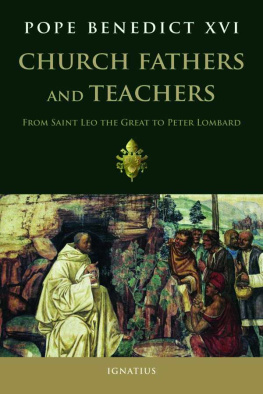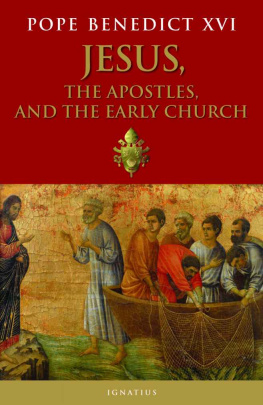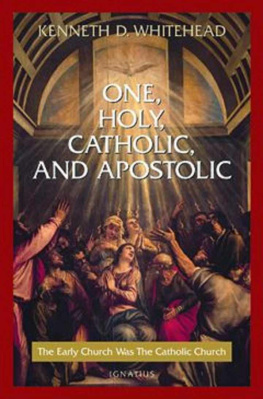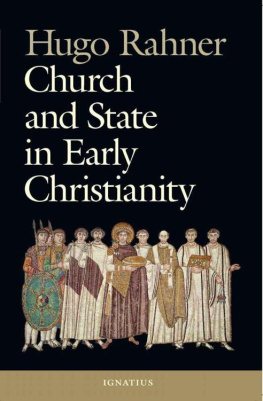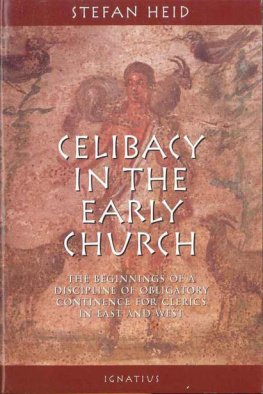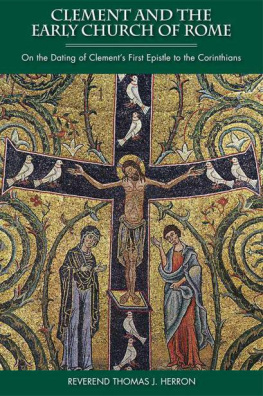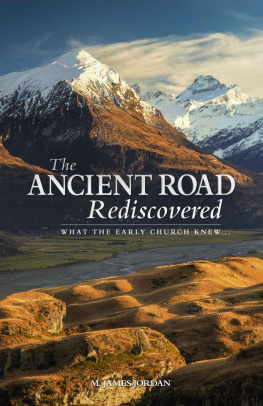FOUR WITNESSES
ROD BENNETT
FOUR WITNESSES
The Early Church in Her Own Words
IGNATIUS PRESS SAN FRANCISCO
Unless otherwise noted, all Scripture quotations (except those included within the patristic texts themselves) have been taken from the Revised Standard Version of the Holy Bible, the Old Testament 1952, and the New Testament 1946, by the Division of Christian Education of the National Council of the Churches of Christ in the United States of America.
Excerpts from the English translation of the Catechism of the Catholic Church for use in the United States of America copyright 1994, United States Catholic Conference, Inc.Libreria Editrice Vaticana. English translation of the Catechism of the Catholic Church: Modifications from the Editio Typica copyright 1997, United States Catholic conference, Inc.Libreria Editrice Vaticana. Used with permission.
Cover art by Christopher J. Pelicano
Cover design by Roxanne Mei Lum
2002 Ignatius Press, San Francisco
All rights reserved
ISBN 0-89870-847-8
Library of Congress Control Number 2001088858
Printed in the United States of America
This book is gratefully dedicated to the memory of
John Henry Newman
The Fathers are primarily to be considered as witnesses, not as authorities. They are witnesses of an existing state of things, and their treatises are, as it were, histories teaching us, in the first instance, matters of fact, not of opinion. Whatever they themselves might be, whether deeply or poorly taught in Christian faith and love, they speak, not their own thoughts, but the received views of their respective ages.
Primitive Christianity: Essays and Sketches, 1833-1836
Contents
Introduction
The early Church is no mystery. As a matter of fact, most believers would be astonished to learn just how much we do know about the first three hundred years of Christian history. We have, for example, much inspiring history about the founding of her many congregations throughout the ancient world. We actually know the names of some of her earliest pastors, and in a few cases we have their writings to read. We still have harrowing accounts of her persecution by the Pharisees and by the pagan Romans. We know what sorts of heresies attacked the early Church and, once again, the very names of the heretics who stood against her. We have hymns and prayers and poetry preserved from this period. We have epitaphs from Christian tombs. We have doctrinal statements, Bible commentary, and sermons dating from these days. We have responsive readings used in church; in fact, we have a good deal of information about how the Sunday services were conducted. To put it briefly, we have (contrary to popular belief) a very vivid picture of primitive Christianityand a picture that is open for investigation by anyone. Some Christians speculate that when Constantine legalized the faith in A.D. 313 many half-converted pagans corrupted the Church by introducing elements retained from their old beliefs. If you are anything like me, you will be amazed to discover that we have literally thousands of pages of documentation dating from long, long before this legalizationmuch of which is, to the emperor Constantine, as distant backward in time as the Declaration of Independence is to President George W. Bush. And this information is reliable. Most of us have heard, I suppose, of apocryphal Christian writings from the first and second centuries; spurious books like The Gospel of Thomas and The Acts of Paul. These were pseudo-scriptures manufactured by early cults like the Gnostics and Manichees to shore up their false teachings; they were condemned by the Church as soon as they appeared. But this same Church produced post-New Testament writings; works that, while not to be classed with the inerrant Word of God, do accurately represent the character, teachings, and practices of the very earliest Christians. Priceless artifacts such as The Martyrdom of Polycarp, The Epistle of Barnabas, and The Shepherd of Hermas all of these come down to us with as much trustworthiness as any ancient document, as reliable as the Jewish Antiquities of Josephus or Plutarchs Lives of the Noble Romans. All of todays Christian scholars agree that these invaluable records really are authentic productions of the early Church. There is nothing apocryphal about them. They have all the authoritynot, indeed, of Scripturebut of history.
And yet, like most modern believers, I have lived practically all of my Christian life knowing next to nothing about any of this. Until I discovered these writings a few years ago any vague ideas I might have had about the early Church came straight out of old C. B. DeMille movies. I honestly did not think it was possible to know much moreor I believe I would have tried harder. Looking back, I can see that I had a very sincere (but completely ungrounded) conviction that the period from Revelation to Constantine was Terra Incognita a gaping Dark Continent on the map of history. After all, I had spent quite a lot of time in denominations, para-church movements, and home-cell groups whose publicly announced intention was to restore the pure Christianity of the early Church. Not one of them had ever sent me back to any first- or second-century documentation for evidence. So who knew? Who could have imaginedwith so many competing versions of pure New Testament Christianity on the market out therethat finding out what the early Church was like might be as simple as opening up the records and having a look?
Like many of you readers, I suspect, I have been familiar with the Scriptures since childhoodto my eternal benefit. Raised in a strong, Bible-believing branch of Protestant Evangelicalism, I was taught to glory in the famous Reformation rallying cry of Sola Scriptura the fiery conviction that the Bible and the Bible alone constitutes the basis for Christian belief. We saw this as the only way to prevent mere traditions of men from creeping into our religion. But was it perhaps this honorable passion to defend the uniqueness of Scripture that eventually led us to neglect such a huge treasure chest of testimony about the early Church? In our sincere eagerness to be Bible Christians, had we perhaps come to undervalue the witness of Gods hand in Church history? I really had to start taking this possibility seriously when I learned that even my Reformation heroes had not hesitated to reference these ancient writings. Even Luther and Calvinthe very men who taught us Sola Scriptura in the first placeknew and respected these venerable saints whom ancient custom has given the title Fathers of the Church. They quite often used the writings of early giants like Ambrose and Augustine to bolster their various arguments. In fact, I eventually discovered that John Calvin had not only affirmed the testimony of these Church Fathers but unequivocally declared that for the first six hundred years of her existence on earth the Church had remained pure and undefiled.
This was good enough for megood enough, in fact, to start at least one old-fashioned Baptist from the Bible Belt looking into the lives and teachings of exotic sounding characters like Cyprian of Carthage, Gregory Nazianzen, Epiphanius of Salamis, and Didymus the Blind. Poking around in a local Christian bookshop one rainy afternoon, I stumbled upon a set of books entitled The Ante-Nicene Fathers (ante-Nicene refers to the period prior to the Council of Nicaea, held in A.D. 325). They were squirreled away on a back shelfat least ten volumes, reprinted from an old nineteenth-century edition issued in England by an Anglican publisher. I gingerly cracked the covers, apparently the first customer to do so. Within five minutes I knew that I had just dropped down the rabbit hole into Wonderland. Two whole volumes in this setbig, fat, hard-bound library books stuffed with tiny printdid not have a word in them written later than A.D. 200. I do not mind saying that I leapt in with both feet.
Next page
